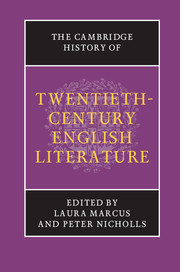Book contents
- Frontmatter
- Introduction
- PART ONE WRITING MODERNITY
- PART TWO THE EMERGING AVANT-GARDE
- 5 Edwardians to Georgians
- 6 The avant-garde, bohemia and mainstream culture
- 7 ‘Our London, my London, your London’: the Modernist moment in the metropolis
- 8 Futurism, literature and the market
- 9 Literature and World War I
- PART THREE MODERNISM AND ITS AFTERMATH, 1918–1945
- PART FOUR POST-WAR CULTURES, 1945–1970
- PART FIVE TOWARDS THE MILLENNIUM, 1970–2000
- Bibliography
- Index
- References
8 - Futurism, literature and the market
from PART TWO - THE EMERGING AVANT-GARDE
Published online by Cambridge University Press: 28 March 2008
- Frontmatter
- Introduction
- PART ONE WRITING MODERNITY
- PART TWO THE EMERGING AVANT-GARDE
- 5 Edwardians to Georgians
- 6 The avant-garde, bohemia and mainstream culture
- 7 ‘Our London, my London, your London’: the Modernist moment in the metropolis
- 8 Futurism, literature and the market
- 9 Literature and World War I
- PART THREE MODERNISM AND ITS AFTERMATH, 1918–1945
- PART FOUR POST-WAR CULTURES, 1945–1970
- PART FIVE TOWARDS THE MILLENNIUM, 1970–2000
- Bibliography
- Index
- References
Summary
‘On or about December 1910, human character changed.’ Virginia Woolf’s famous formulation has always conveniently served to mark the beginning of real Modernism in England, separating it from the more tentative anticipations of the Edwardian era. But Woolf was pointing also to a more general social change, visible to her, for example, in the friendly insubordination of domestic servants. The contemporary cook would be ‘in and out of the drawing room… to borrow the Daily Herald’. Insubordination of various kinds, amounting to a militant unwillingness to know one’s place and stay in it, was by 1914 to bring Britain to the brink of civil war in Ireland, and to the brink of a possible revolution, triggered by a likely general strike in the same year. The House of Commons showed its own lack of subordination to the Lords by passing the Parliament Act in 1911, after two general elections caused by the Lords’ obstructiveness after the ‘People’s Budget’ of 1909. Henceforth the upper house had no power to alter money bills, and its right to veto other bills was restricted to two successive sessions of Parliament. But Parliament no longer commanded much respect. Woolf’s cook would have found in the Daily Herald she borrowed from her employer that parliamentary debates were reported under the heading ‘The House of Pretence’. The Herald was founded in 1911, aimed at the working-class; part of Woolf’s point about change was that it was the mistress of the household who subscribed to this working-class paper.
- Type
- Chapter
- Information
- The Cambridge History of Twentieth-Century English Literature , pp. 132 - 151Publisher: Cambridge University PressPrint publication year: 2005
References
- 1
- Cited by



